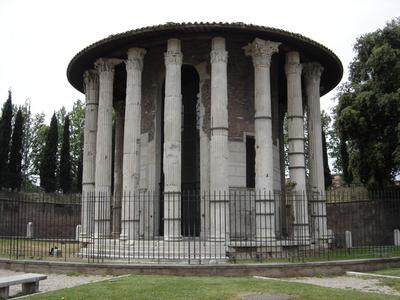What does the Greek word akatharsian mean in Romans 1:24?
by Augustus
(Southern California)
In Romans 1:24, Paul uses the Greek word ἀκαθαρσίαν akatharsian, translated in the KJV as uncleanness, to describe the idolatry of temple prostitutes. In Romans 6:19 Paul uses the Greek word ἀκαθαρσίᾳ akatharsia, to inform us that some Roman Christians had been saved out of the idolatrous lifestyle of shrine prostitutes, similar to what Paul wrote to Corinthian Christians in 1 Corinthians 6:9-11.
In Romans 1, Paul is NOT describing two gay guys or two gay gals who fall in love with each other. Instead, he describes idolatry, so common in Old Testament times and in first century Rome, an idolatry characterized by the uncleanness of shrine prostitutes and their temple prostitution.
Is this belief historical revisionism by gays to alibi our sin? Or is this the normal view of church history for two thousand years? Our gay Christian understanding perfectly fits the facts of history and the way akatharsia was used in ancient times and for most of the last two thousand years.
The ancient translators of
the Greek Septuagint believed this
The ancient Jewish translators of the Septuagint, a second century BC translation of the Hebrew Old Testament into Greek, understood that the Greek word akatharsian was properly used to describe idolatrous worship, as noted in 1890 AD by the Pulpit Commentary note on Hosea 2:10.
The Pulpit Commentary, 1890
and akatharsian
Hosea 2:10 "And now will I discover her lewdness in the sight of her lovers, and none shall deliver her out of mine hand. Deprivation is followed by disgrace, dispossession by dishonor. The figure of a faithless female being continued, the calamities of Israel are pictured in the extreme deplorableness of her condition.
The (Hebrew) word nabluth does not elsewhere occur, but its meaning is not difficult to ascertain. It denotes literally, "slackness," "laxness," or a withered state, from navel, to be withered, and may be translated either "her shame" or "her turpitude." (The Septuagint) LXX has (translated nabluth as) ἀκαθαρσίαν - akatharsian...
Thus she is exposed to the derision and disgust of her former admirers and paramours; while deliverance is out of the question. Her lovers are the idols, or, according to Kimchi, "Egypt and Assyria, which cannot deliver her." She who once was the object of delight is become the object of disdain and contempt; nor is there any of her lovers desirous of or able to deliver her out of the hand of him who administers the justly deserved punishment." Pulpit Commentary, Hos 2:10
A Pagan Altar and akatharsian
2 Chronicles 29:5
In 2 Chronicles 29:5, the Septuagint translates נִדָּה the Hebrew word for filthiness into the Greek word, ἀκαθαρσίαν, akatharsian meaning uncleanness or filthiness. The context is King Hezekiah cleansing the Jewish temple of the filth of idolatry, left over from the reign of the wicked King Ahaz, 2 Chronicles 28:1-4, 22-25. The idolatry of King Ahaz included a pagan altar which Ahaz saw in Damascus. He had it copied and placed it in the Jewish temple in Jerusalem, 2 Kings 16:10-16
Adam Clarke Commentary, 1831
on the idolatrous altar
Ahaz sent to Urijah the priest the fashion of the altar. This was some idolatrous altar, the shape and workmanship of which pleased Ahaz so well that he determined to have one like it at Jerusalem. For this he had no Divine authority, and the compliance of Urijah was both mean and sinful. That Ahaz did this for an idolatrous purpose, is evident from 2 Chronicles 28:21-25: "For he sacrificed to the gods of Damascus;-and he said, Because the gods of the kings of Syria help them, I will sacrifice to them, that they may help me. And he made high places to burn incense to other gods in every city of Judah."
Verse 14. Put it on the north side He seems to have intended to conform every thing in the Lord's house as much as possible to the idolatrous temples which he saw at Damascus, and to model the Divine worship in the same way: in a word to honour and worship the gods of Syria, and not the God of heaven. All the alterations specified here were in contempt of the true God. Thus he provoked to anger the Lord God of his fathers, 2 Chronicles 28:25.
The Apostle Paul
The apostle Paul was a consummate scholar, fluent in many languages, 1 Cor 14:18. "I thank God that I speak in foreign languages more than all of you." International Standard Version
When Paul uses the Greek words, ἀκαθαρσίαν akatharsian in Romans 1:24 and ἀκαθαρσίᾳ akatharsia in Romans 6:19, he does it intentionally, to remind his readers of the link between temple prostitution in the Old Testament and the idolatry practiced in first century Rome. Paul's use of the Greek words akatharsian and akatharsia in AD 58 conveyed the commonly understood meaning of idolatry or worshiping pagan gods.
Paul uses this Greek word nine of the ten times it occurs in the New Testament, Romans 1:24, 6:19, 2 Cor 12:21, Gal 5:19, Eph 4:19, 5:3, Col 3:5, 1 Thess 2:3, 4:7. That Paul used this word in his letters to the churches indicates he intended to denounce idolatrous sexual worship of false gods, including Cybele, the Phrygian mother goddess.
Ezra 9:11 also uses the Hebrew word, נדה niddah, signifying uncleanness or filthiness related to idols and the Septuagint again translates niddah using the Greek word, ἀκαθαρσίαις akatharsiais, meaning uncleanness or filthiness. Ezra links the uncleanness with the תועבה towebah, abominations of the pagan idolaters.
The prophet Jeremiah reinforces, 1. why Hezekiah needed to cleanse the temple, and 2. what Paul intended to convey when he used akatharsian in Romans 1:24 and akatharsia in Romans 6:19. "But they put their detestable things in the house which is called by My name, to defile it." Jeremiah 32:34. The Septuagint translates Jeremiah 32:34 using the Greek word, ἀκαθαρσίαις akatharsiais, referring to the uncleanness of idol worship.
The Septuagint translates the Hebrew word, טמא tame' with ἀκαθαρσίαις akatharsiais. The paraphernalia of idols and idol worship, including the pagan altar from Damascus, replicated by Ahaz, in Hezekiah's day, littered the Jewish temple in Jerusalem.
The Septuagint, a Greek translation of the Hebrew Tanakh (our Old Testament), conveyed the common Jewish and Christian understanding, that akathartos describes pagan idolatry. The Greek words Paul used to describe idol worship in first century Rome, like akatharsian in Romans 1:24 and akatharsia in Romans 6:19, reflect that ancient understanding of the meaning of akatharsian.
Scripture cannot mean now
what it did not mean then
If you disagree with the historical fact that the Greek words akatharsian and akatharsia and related forms were understood by ancient Jews and our Christian ancestors as references to idolatry and idol worship and pagan altars or that Romans 1 addresses temple prostitution, your argument really isn't with gay Christians. Your argument is with ancient Jewish translators more than 2200 years ago and first century Christians like the apostle Paul or second century Christians like Aristides and Justin Martyr.
Two thousand years ago, they understood, far better than the modern anti-gay crowd, that the Greek words Paul used described idolatry, not two gay guys or two gay gals who fall in love and spend their lives in committed partnership.
Conclusions based on facts
- There is no linguistic reason to believe that the Greek word, akatharsian, in Romans 1:24, was used by Paul to describe lesbians and gay men.
- There are no cultural or historical or religious reasons to believe that Paul was describing lesbians and gay men in Romans 1.
- Facts indicate that ancient Jewish scholars, ancient Christian preachers and conservative Christian Bible commentators for the last 2000 years, understood that the Greek word, akatharsian, described the uncleanness of pagan idolatry.
Return to Gay Christian FAQ
Return to 101 Community
Return to
Gay Christian 101 Home Page
What must I do to be saved?
Leviticus 17:7 and goat idols
Jesus Teaches Hell 101
Photo of the Temple of Hercules in the Forum Boarium, Rome, by Ryan Freisling, is in the public domain, via wikimedia.org
This page updated June 3, 2016



